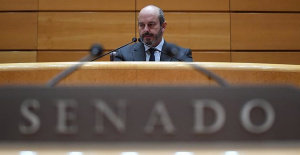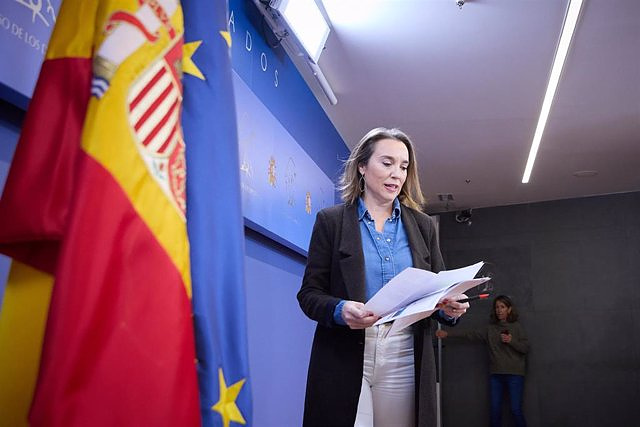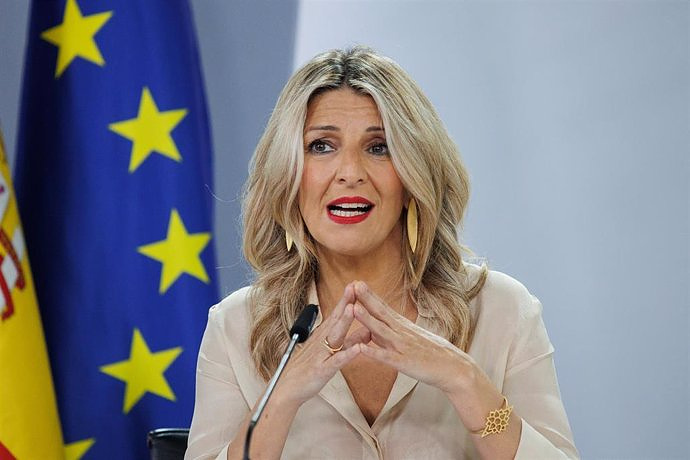Ask to separate them from issues such as 25% of Spanish in Catalan classrooms, euthanasia or the Wealth Tax
MADRID, 1 Feb. (EUROPA PRESS) -
The Popular Parliamentary Group has challenged the two magistrates of the Constitutional Court (TC) proposed by the Government, Juan Carlos Campo and Laura Díez, to remove them from eight appeals, considering that due to their previous jobs as Minister of Justice and a senior Moncloa official they could having participated "directly or indirectly" in them, as well as by "manifest friendship or enmity" with any of the parties.
As reported by the 'popular' in a statement, they ask to separate Campo and Díez from the unconstitutionality appeals, pending resolution in the TC, against the Catalan regulations on linguistic projects and use of official languages in non-university education; the law of euthanasia; the 'ryder' law; the Celaá law; and the decree-law of May 4, 2021 on the state of alarm for the coronavirus pandemic.
It also challenges them regarding the challenges to the decree law of January 19, 2021, for the protection of consumers and users in situations of social and economic vulnerability, "since the PP understands that the Government does not respect private property and favors the ' squatting'"; and the 2021 Budget Law that reestablished the Wealth Tax.
Likewise, it seeks to prevent Campo and Díez from being aware of the appeal against the legal reform that prohibited a General Council of the Judiciary (CGPJ) in office -like the current one, which has been expired for more than four years-- from making discretionary appointments at the top judicial.
Campo is also challenged in relation to a ninth matter, the amparo appeal filed by the PP against the amendments on the reform of the organic laws of the TC and the CGPJ, which were presented as part of the penal reform to eliminate sedition and modify embezzlement.
Specifically, explains the PP, "the former minister is challenged in the case of the amparo appeal before the TC against the agreement of the Bureau of the Justice Commission of Congress on December 12, 2022 and the agreement of the president of said Commission , of December 13 of the same year.
The 'popular' explain that they launch these challenges considering that "both magistrates appointed in the TC by the Government incur in any of the causes of challenge provided for in section 13 of article 219 of the Organic Law of the Judiciary (LOPJ)".
"Among the causes for recusal included in said regulations is intimate friendship or manifest enmity with any of the parties," the 'popular' stand out.
They also mention as a reason "having held a public office, held a job or exercised a profession on the occasion of which they have participated directly or indirectly in the matter that is the subject of the lawsuit or cause or in another related to it; or having held a public office, held a job or exercised a profession on the occasion of which he has participated directly or indirectly in the matter that is the subject of the lawsuit or cause or in another related to it".
It should be remembered that Díez has already refrained from matters related to the Catalan law that eliminates 25% of Spanish in the classroom, since last summer she signed opinions of the Council of Statutory Guarantees of Catalonia, as vice-president, in favor of not to impose said percentage in the classes of the autonomous community.
Campo has also abstained from several issues, such as the appeals against the "only yes is yes law", the vote on the labor reform, the withdrawal of the seat of former "purple" deputy Alberto Rodríguez, the formula used by some deputies to abide by the Constitution in the constitutive session of the Congress of Deputies in May 2019 and against the decision of the Lower House not to claim the pardon files from the Government.
The Plenary of the TC has already endorsed the abstentions of Campo and Díez for the 'only yes is yes', the vote on the labor reform and a matter related to 25% of Spanish, although their decision to voluntarily depart from the rest of the issues it will be addressed in next week's conclave.
In the case of the former Minister of Justice, this step aside is due not only to his previous responsibility, but also to his sentimental relationship with the president of the Congress of Deputies, Meritxell Batet.
In addition, the next plenary session will address the abstention of another magistrate, Concepción Espejel, from the 'popular' appeal against the abortion law of the Government of José Luis Rodríguez Zapatero. Five former PP deputies have challenged her, along with the president of the TC, Cándido Conde-Pumpido, Inmaculada Montalbán and Campo, although the latter have not abstained.
If the four were separated, the TC would be left without the minimum of 8 magistrates it needs to resolve the appeal against the abortion law, presented more than ten years ago. However, the legal sources consulted by Europa Press assure that the Constitutional Court will defend its jurisdiction in this case by applying its repeated doctrine to avoid this lack of 'quorum'.

 Exploring Cardano: Inner Workings and Advantages of this Cryptocurrency
Exploring Cardano: Inner Workings and Advantages of this Cryptocurrency Seville.- Economy.- Innova.- STSA inaugurates its new painting and sealing hangar in San Pablo, for 18 million
Seville.- Economy.- Innova.- STSA inaugurates its new painting and sealing hangar in San Pablo, for 18 million Innova.- More than 300 volunteers join the Andalucía Compromiso Digital network in one month to facilitate access to ICT
Innova.- More than 300 volunteers join the Andalucía Compromiso Digital network in one month to facilitate access to ICT Innova.-AMP.- Ayesa acquires 51% of Sadiel, which will create new technological engineering products and expand markets
Innova.-AMP.- Ayesa acquires 51% of Sadiel, which will create new technological engineering products and expand markets The amnesty faces its final stretch in the Senate with the question of whether it will be voted this week or after the Catalan elections.
The amnesty faces its final stretch in the Senate with the question of whether it will be voted this week or after the Catalan elections. The PP will send to Moncloa the 1,136 letters from citizens with their real problems that it received in Sánchez's reflection
The PP will send to Moncloa the 1,136 letters from citizens with their real problems that it received in Sánchez's reflection Carola Miró, wife of former president of the Generalitat Quim Torra, dies
Carola Miró, wife of former president of the Generalitat Quim Torra, dies 12M.- Díaz asks Sánchez to recognize the Palestinian State in the next Council of Ministers
12M.- Díaz asks Sánchez to recognize the Palestinian State in the next Council of Ministers How Blockchain in being used to shape the future
How Blockchain in being used to shape the future Not just BTC and ETH: Here Are Some More Interesting Coins Worth Focusing on
Not just BTC and ETH: Here Are Some More Interesting Coins Worth Focusing on A sensor system obtains the fingerprint of essential oils and detects if they have been adulterated
A sensor system obtains the fingerprint of essential oils and detects if they have been adulterated Faraday UPV presents the 'Origin' rocket to exceed 10 km of flight: "It is the beginning of the journey to space"
Faraday UPV presents the 'Origin' rocket to exceed 10 km of flight: "It is the beginning of the journey to space" The Generalitat calls for aid worth 4 million to promote innovation projects in municipalities
The Generalitat calls for aid worth 4 million to promote innovation projects in municipalities UPV students design an app that helps improve the ventilation of homes in the face of high temperatures
UPV students design an app that helps improve the ventilation of homes in the face of high temperatures A million people demonstrate in France against Macron's pension reform
A million people demonstrate in France against Macron's pension reform Russia launches several missiles against "critical infrastructure" in the city of Zaporizhia
Russia launches several missiles against "critical infrastructure" in the city of Zaporizhia A "procession" remembers the dead of the Calabria shipwreck as bodies continue to wash up on the shore
A "procession" remembers the dead of the Calabria shipwreck as bodies continue to wash up on the shore Prison sentences handed down for three prominent Hong Kong pro-democracy activists
Prison sentences handed down for three prominent Hong Kong pro-democracy activists ETH continues to leave trading platforms, Ethereum balance on exchanges lowest in 3 years
ETH continues to leave trading platforms, Ethereum balance on exchanges lowest in 3 years Investors invest $450 million in Consensys, Ethereum incubator now valued at $7 billion
Investors invest $450 million in Consensys, Ethereum incubator now valued at $7 billion Alchemy Integrates Ethereum L2 Product Starknet to Enhance Web3 Scalability at a Price 100x Lower Than L1 Fees
Alchemy Integrates Ethereum L2 Product Starknet to Enhance Web3 Scalability at a Price 100x Lower Than L1 Fees Mining Report: Bitcoin's Electricity Consumption Declines by 25% in Q1 2022
Mining Report: Bitcoin's Electricity Consumption Declines by 25% in Q1 2022 Oil-to-Bitcoin Mining Firm Crusoe Energy Systems Raised $505 Million
Oil-to-Bitcoin Mining Firm Crusoe Energy Systems Raised $505 Million Microbt reveals the latest Bitcoin mining rigs -- Machines produce up to 126 TH/s with custom 5nm chip design
Microbt reveals the latest Bitcoin mining rigs -- Machines produce up to 126 TH/s with custom 5nm chip design Bitcoin's Mining Difficulty Hits a Lifetime High, With More Than 90% of BTC Supply Issued
Bitcoin's Mining Difficulty Hits a Lifetime High, With More Than 90% of BTC Supply Issued The Biggest Movers are Near, EOS, and RUNE during Friday's Selloff
The Biggest Movers are Near, EOS, and RUNE during Friday's Selloff Global Markets Spooked by a Hawkish Fed and Covid, Stocks and Crypto Gain After Musk Buys Twitter
Global Markets Spooked by a Hawkish Fed and Covid, Stocks and Crypto Gain After Musk Buys Twitter Bitso to offset carbon emissions from the Trading Platform's ERC20, ETH, and BTC Transactions
Bitso to offset carbon emissions from the Trading Platform's ERC20, ETH, and BTC Transactions Draftkings Announces 2022 College Hoops NFT Selection for March Madness
Draftkings Announces 2022 College Hoops NFT Selection for March Madness
























